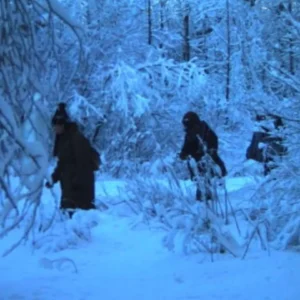Much furled-eyebrow puzzlement and perplexed pearl-clutching have followed President-elect Donald Trump’s recent vow to inflict 25-percent trade tariffs against Canada – the same as against Mexico — until America’s northern neighbor gets its illegal immigration and drug smuggling house in order.
“To compare us to Mexico is the most insulting thing I’ve ever heard from our friends and closest allies, the United States of America,” Ontario Premier Doug Ford reacted, for example. “I found his comments unfair. I found them insulting. It’s like a family member stabbing you right in the heart.”
“We shouldn’t confuse the Mexican border with the Canadian border,” Canadian Industry Minister Francois-Philippe Champagne said.
But many who live in New Hampshire, where many who illegally crossed the U.S.-Mexico border have settled, may feel surprised to know why Trump has Canada pegged just about right. Despite that Republicans during the recent campaign cycle focused on illegal immigrants and drugs that came over the Mexican border and ended up in the Granite State, its governor, for instance sending New Hampshire National Guard troops to Eagle Pass, Texas. Local news media followed the bouncing ball to the U.S.-Mexico border with claims that Republican concerns were laced with “misinformation” and aired false denialism narratives about sharp increases of illegal alien apprehensions from Canada in the Border Patrol’s Swanton Sector covering New Hampshire’s 58 miles of frontier.
But since Trump’s tariff threat is likely to spark off much more public wonderment and denialism about Canadian border policy, New Hampshire residents on both sides of the aisle should know that Canada has committed quite real and egregious border security sins that received far less analysis than they have deserved.
Because those sins have wrought years of U.S. national security and public safety havoc. Remember that illegal immigration and drug smuggling are not always about quantity so much as criminal lethality within it the flow.
Much of the U.S. homeland security havoc arises from an historic Canadian legal immigrant importation program of unprecedented scope. Since the program’s 2021 implementation, the Great White North has imported some 1.5 million foreign national workers (400,000+ per year for the nation of 38 million) from dozens of developing nations and hundreds of thousands more foreign students in just 2023 – the third record-breaking year of those.
Why are those programs a U.S. problem? Because the spiking number of foreign nationals that have entered through the Swanton Sector and elsewhere are apparently abusing the Canadian programs as a Lilly pad from which to illegally enter the United States between northern border land ports of entry, among them proven threats to U.S. national security and public safety.
Although total numbers illegally entering from Canada are small relative to those crossing from Mexico, this is more a matter of who is crossing. Many that Canada is importing hail from Muslim-majority nations and have, according to Canadian media reports, fueled a spate of terrorism and anti-Semitic attacks there.
As well, a separate Canadian policy has opened the northern gates to Mexican cartel killers and professional traffickers who have set up human and drug smuggling networks all along the U.S.-Canada border.
Consider that U.S. Border Patrol apprehensions in the brush between U.S.-Canada land ports of entry jumped from 2,238 in FY2022 to 10,021 in FY2023 and then 23,721 in FY2024, for a total of 33,742 those last two years. The majority in those two years – 26,320 – came through the Swanton Sector, an historically multinational bunch.
Among those crossing in illegally from Canada, for instance, were 15,827 Indian nationals in FY 2023 and 2024, but quite notably 8,367 Mexicans, and 3,833 from unspecified countries listed only as “Other” on the U.S. Customs and Border Protection’s public statistics website.
Concern on both sides of the U.S.-Canada line has simmered for some years as Canadians saw their legal newcomers carry out terror plots, actual attacks, and probably some of the record-breaking nearly 6,000 antisemitic incidents Canada logged since the Israel-Hamas war broke out. The threat was obvious to many.
“Canada has become a hotbed of radicalization, fanaticism, and jihadism,” wrote Casey Babb, Senior Fellow with the Macdonald-Laurier Institute in Newsweek shortly after the arrest. “As un-Canadian as it sounds, Canada has a terrorism crisis on its hands and that should worry the United States for a whole host of reasons.”
Concern would reach an apogee in October 2024, when a joint U.S.-Canadian counterterrorism operation thwarted a plot by a Pakistani student on a Canadian visa to illegally cross the northern border to conduct an October 2024 massacre of Jews in New York.
Muhammad Shahzeb Khan, a 20-year-old Pakistani citizen legally issued a Canadian student visa in June 2023, now stands accused in U.S. federal court of plotting an illegal-smuggler-assisted northern border crossing to carry out a mass shooting of Jews in New York City to celebrate with blood the October 7 anniversary of the Hamas massacre in Israel. Khan hoped it would go down in history as “the largest U.S. attack since 9/11”.
“We are going to nyc (sic) to slaughter them” with AR-style rifles and hunting knives “so we can slit their throats,” Khan told an undercover FBI agent he believed to be a co-conspirator, according to an agent complaint. “Even if we don’t attack an event we could rack up easily a lot of Jews.”
His was among the record-breaking 400,000 foreign student visas Canada issued in 2023.
That alarming new terrorism prosecution in New York State should have been enough to renew Trump’s interest in turning diplomatic pressure onto Canadian Prime Minister Trudeau’s mass legal immigration policies and border security on its side.
But terrorists are not the only concern.
The incoming Trump administration 2.0 will need to force resolution of another issue of U.S. public safety concern dating to an especially damaging 2016 Trudeau move that went unaddressed until only recently. Trudeau rescinded 2009 visa requirements on Mexican citizens and against the advice of his own government that Mexican criminals would abuse the policy to fly in at will and bedevil Canadian cities and northern American ones too.
That’s just what was happening again by early 2017. A sustained surge was underway of Mexican nationals who, unable to easily cross the southern border under Trump 1.0, were flying over the United States into Canada. They would claim Canadian asylum, then cross southward over the less tended northern U.S. border.
Among them were the predictable – and predicted – Mexican cartel operatives.
Leaked Canada Border Services Agency intelligence reports said Mexican “drug smugglers, human smugglers, recruiters, money launders and foot soldiers” were turning up in greater numbers than ever before. The cartels went to work building human and drug smuggling networks to move other Mexicans and more drugs south over the American border, just as they did all along the southern border.
This northern cartel penetration is no doubt how more fentanyl in pill form has made its way into New Hampshire in recent years. Drug Enforcement Administration officials have warned New Hampshire about this scourge’s spread in the state, even though they did not specifically note that the drug cartels they name happen to be operating just over the border in Canada thanks to Trudeau’s Mexican visa-free policy.
But that’s almost certainly the case as it is a solid explanation for why so many Mexicans with criminal records are operating in Canada and crossing into the United States.
In July 2017, Global News quoted published the intelligence reports saying the ultra-violent Sinaloa cartel had turned up in Canada to “facilitate travel to Canada by Mexicans with criminal records.” Others identified included La Familia Michoacana, Jalisco New Generation, and Los Zetas.
By May 2019, at least 400 Mexican criminals connected to drug trafficking, including sicario hitmen, were plying their trades in Canada, at least half of them in Quebec, according to a May 24, 2019, report in the Toronto Sun and other Canadian media outlets.
All had entered through the Trudeau visa loophole for Mexicans.
In their October 2021 book, “The Wolfpack: The Millennial Mobsters Who Brought Chaos and the Cartels to the Canadian Underworld,” journalists Peter Edwards and Luis Najera established the Sinaloa Cartel now has a foothold across eastern Canada, with “solid control of cocaine shipments in and out of Canada.” The Arellano Felix group has its foothold in Vancouver and in the state of Alberta.
The Zetas are in Canada “involved with temporary migrant workers.”
Only in February 2024 did the Americans pressure the Canadians finally begin to roll back some – but not all — of its visa-free Mexicans policy, because the influx was causing these problems. Now, only Mexicans who already hold a U.S. visa or old Canadian one can travel visa-free, while most other Mexicans with neither will have to apply for a Canadian one.
But there is more to do there.
The residents of New Hampshire would more thoroughly enjoy their front row view of the Canadian border if Trump succeeds in forcing Canada to change its ways.
Todd Bensman is author of OVERRUN: How Joe Biden Unleashed the Greatest Border Crisis in U.S. History





